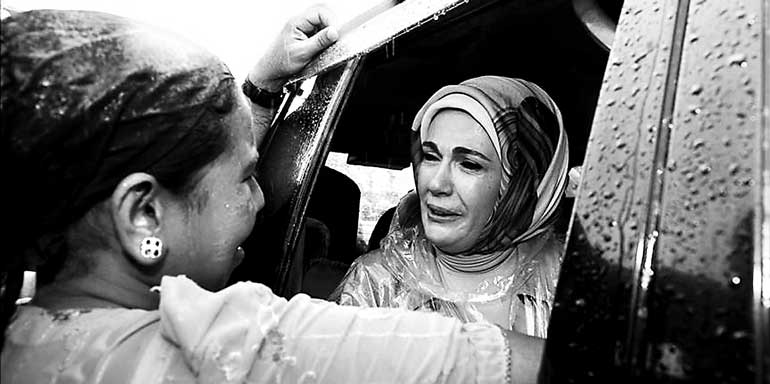Friday Feb 20, 2026
Friday Feb 20, 2026
Saturday, 9 September 2017 00:00 - - {{hitsCtrl.values.hits}}

The mounting humanitarian crisis concerning the Rohingya Muslims of Rakhine State in North Western Myanmar, which has displaced an estimated 365,000 and led to the death of about 400 so far, has invited strong condemnatory statements from the UN Secretary General Antonia Guterres, who warned of the risk of “ethnic cleansing” and Pope Frances, who spoke of the “persecution” of the Rohingyas.
Among the world’s Muslim countries, Indonesia and Turkey have gone beyond expressing concern and intervened to mitigate the suffering of the Rohingyas. Indonesian Foreign Minister, Retno Marsudi, telephoned her Bangladeshi counterpart, A.H. Mahmood Ali. In December last year, Marsudi had visited Bangladesh to hold talks on the Rohingya issue and visit refugee camps in Cox’s Bazar.
The Turkish President and current chair of the Organization of Islamic Cooperation (OIC), Recep Tayyip Erdogan, sent First Lady Emine Erdogan to Bangladesh to personally interact with the Rohingya refugees living in squalid camps in Cox’s Bazaar and offer help. At Cox’s Bazaar, the Turkish First Lady called on the international community “not to stay silent to this humanitarian tragedy, unacceptable in this day and age.”
With an estimated 165,000 Rohingyas arriving in Bangladesh in the last fortnight, the World Food Program estimates that the total number of arrivals can go up to 300,000. Bangladesh had already been hosting 200,000 Rohingyas and is desperately in need of international aid today. President Erdogan has been discussing the issue with several Muslim leaders to find a solution.
Meanwhile, Bangladesh allowed the Turkish Cooperation and Coordination Agency or TIKA to distribute 1,000 tons of aid to Rohingya Muslims in Rakhine. This is part of the 10,000 tons pledged by Erdogan. Turkey has asked Bangladesh to open its borders to the fleeing Rohingyas, vowing to bear the cost of relief and rehabilitation of 100,000 Rohingya families.
Turkey’s interest in the Rohingyas
Since Myanmar’s democratic transition began in 2011, violence between the country’s majority Buddhists and its Muslim minority has escalated. The 2012 riots in Rakhine State, where Muslims are 45% of the population, had led to several deaths and mass displacement of Muslims. There were riots in October 2016 and a Rohingya Islamic insurgent attack on 30 Security Forces camps on 25 August this year. Retaliatory actions led to mass displacement.
Having opened its embassy in Myanmar in March 2011, Turkey had adopted an active stance towards the Rohingya’s plight. It took the issue to the UN and initiated the formation of the Rohingya Contact Group under the OIC. The Turkish Red Crescent, Turkish Cooperation and Coordination Agency (TIKA), and the Disaster and Emergency Management Authority (AFAD), got actively involved in Myanmar.
“Humanitarian assistance and mediation efforts in international conflicts has become a key point in Turkey’s foreign policy. In this context, Turkey is playing a proactive stance in the Rohingya issue,” Dr. Altay Atli, a researcher on International Politics and Economics in the Asian Rregion in Istanbul’s Sabanci University told Xinhua.
Erdogan has been wanting Turkey to be the “hope for the oppressed.” And this is much appreciated by the Turkish masses who are conservative and pious. His pro-poor policies within the framework of Islam have kept him in power since 2002, even though he is criticised by the West and human rights groups for being authoritarian.
Turkey ranks second in the world after the US in foreign assistance with $ 6 billion spent in 2016, half of this amount having been used for the 3.5 million Syrian refugees that it hosts on its soil since the beginning of the civil war there in 2011.
According to Global Humanitarian Assistance Initiative (GHAI), Myanmar is the seventh largest recipient of Turkey’s humanitarian assistance, after Syria, Somalia, West Bank and Gaza Strip, Iraq , Jordan, and Pakistan.
Several humanitarian NGOs, like the Humanitarian Relief Foundation (IHH), one of Turkey’s leading aid group also active in Somalia and Syria, have launched donation campaigns in Turkey and are currently active in Bangladesh to directly channel assistance for the Rohingya refugees.
Referring to Erdogan’s support to the Rohingyas, researcher Dr.Ataly Atli tol Xinhua: “There is much sensibility in Turkey for the cause of this community. People appreciate that the Turkish Government stays active there. The Turkish press reports daily of killing against Muslims in Myanmar amid growing popular interest for this issue that was totally unknown to a vast majority of Turkey until some years ago.”
Erdogan’s humble origins
Erdogan’s concern for the suffering Rohingyas could be traced to his own humble origins. According to former US Ambassador Robert Pearson and researcher Gregory Kist, Erdogan spent his youth in the poor Kasımpaşa district of Istanbul. As a young man, he attended a religious Imam Hatip school, never learned English and had little or no overseas experience. The urge to challenge the existing order is ingrained in him.
“Like any underdog, Erdogan developed a conviction that he had to fight the established structures in order to succeed. This conviction only hardened as the traditional parties and Turkish state tried repeatedly to destroy his political career. In his view, the Turkish establishment gave him no quarter, and he gives them none in return,” Pearson and Kist observe.
“The second component of Erdogan’s mind-set is the Millî Görüş Islamist movement, which has its roots in the Muslim Brotherhood and forms his core political philosophy. In the early days, Erdogan believed in ‘street Islam,’ a populist twist on the more theocratic political Islam of the time, emphasising the role of the people, rather than institutions, as the backbone of political power.”
Erdogan has not touched the secular basis of the Turkish republic in any way. Instead, he has used existing structures to give religion a greater role in society and thus bring the government closer to the ethos of the Turkish people.
In primary and secondary schools, religious studies are compulsory, and the curriculum based on Sunni Islam, is set by the State. Houses of worship of other religions or of other sects of Islam, like churches or cemevis (the prayer houses of Alevis), do not get government support, unlike the sanctioned Diyanet mosques.
By using state institutions to give Sunni Islam a greater role in society, Erdogan serves the interest of his voter base which is overwhelmingly Sunni and pious too. For example, discrimination against women wearing the head scarf has ended. That enables pious Islamic women to attend universities and get elected to parliament.
Erdogan has combined modernity with tradition, while ruling like Putin. The Islamic populism he has fostered has helped him secure domestic support for humanitarian projects abroad such as the one he is hoping to execute among the Rohingyas in distant Bangladesh and Myanmar.